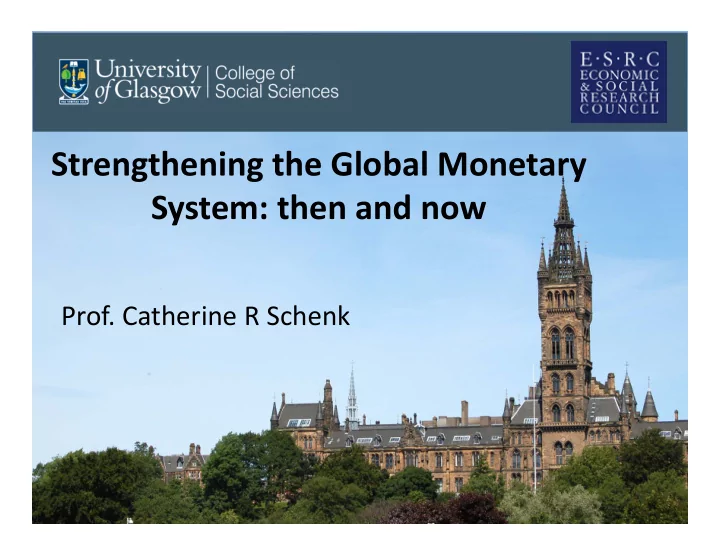

Strengthening the Global Monetary System: then and now Prof. Catherine R Schenk
Challenges for International Monetary System • Volatile commodity prices • Spill ‐ over Effects from USD volatility • Divergent inflation prospects • Role of capital markets in financing development • Vulnerability to volatile capital flows • Challenges of policy reform in a period of low growth/recession (conservatism, economic nationalism)
New International Economic Order May 1974 • Broaden governance of international economy • “Ensuring that one of the main aims of the reformed international monetary system shall be the promotion of the development of the developing countries and the adequate flow of real resources to them” • “Securing favourable conditions for the transfer of financial resources to developing countries” • 1979 ODA/GDP of Developed Countries = 0.34%
Failed Reform Proposals • New Bretton Woods Conference • Substitution Account (1973 ‐ 1981) – Promote the SDR – Reduce reliance on USD • Rules based adjustment process – Reserve indicators, symmetrical sanctions • Tobin Tax: FX volatility, proceeds for deveopment • Governance: NIEO, G77, C20, G24
Actual Reforms • Regional monetary solutions (EMS) • Safety ‐ net to manage decline of sterling (BIS) – International cooperation to manage reserves (equiv £120 billion overlapping credits) • Coordinated multilateral and bilateral swaps • ‘Recycling’ global imbalances through international financial markets – Sovereign Debt Crisis of 1980s • Increase IMF resources and access • G7 Efforts to Coordinate Exchange Rate intervention (Plaza and Louvre Accords)
‘Lessons’ from History • Blurring public/private responsibility = moral hazard • Moving target(s) of reform during instability – Need to coordinate LT and ST interventions and reform (e.g. QE) • Requires consensus building – Leadership: Reluctant, Unable, Unwilling? – Shared interests of developing countries? • Environment of reform matters – SDR reform killed off by inflation, USD rebound • Flexible, informal arrangements may be better than grandiose systemic reforms • No amount of owned reserves is enough for any single country to buck the market
Prospects • Transitional period of governance: sclerosis • Regional solutions: may exclude poorest countries • Enhanced SDR: liquidity, secondary market, invoicing: longer term prospect • Multiple currency system: ‘resilient’ USD, ‘persistent’ Euro, ‘emergent’ RMB – Spread the benefits and burdens of international currency – Increase interdependence among largest economies – Enhance prospects of coordination
Recommend
More recommend